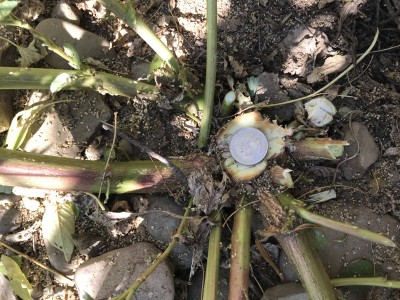Preventing the Spread of Troublesome Weeds at Harvest in Southwest New York
Joshua Putman, Field Crops and Forage Specialist
Southwest New York Dairy, Livestock and Field Crops Program

-Article information adapted from PennState Extension written by Dr. John Wallace and Heidi Reed-
Resistant weeds cause significant yield loss, increased production costs, and are becoming a bigger problem every year in New York. Farmers rarely proactively manage weeds to prevent or delay selection for herbicide resistance. They usually increase the adoption of integrated weed management practices only after herbicide resistance has occurred. Our most problematic herbicide-resistant weeds, like horseweed (marestail), waterhemp, and Palmer amaranth, can easily spread from one field, or one farm, to the next, as seeds get trapped in/on tillage, planting, and harvest equipment and ride field-to-field this time of year.
It is important to be proactive to prevent the spread of seed. You should have a plan going into the harvest season, including the appropriate order to harvest fields and equipment-cleaning protocols. GROW (Get Rid Of Weeds), a publicly-led network that provides resources and tools for implementing integrated weed management, suggests a few ways to prevent the spread of weeds with equipment:
· Scout fields before harvest, and identify which fields have problematic weed species;
· Harvest and/or till herbicide-resistant weed-infested fields, or portions of fields, last;
· If the combine or tillage equipment entering a field has recently been in a field with herbicide-resistant weeds, clean the equipment prior to entering the field, or use different equipment if it is available;
· Carefully and completely clean used equipment upon purchase;
¨ Start cleaning the combine from the top and moving from the header backward
· Use an air compressor to remove as many weed seeds from the combine as possible, including the rock trap, grain auger, and tailings processor;
· Deep clean the combine following the Straw Bale Methodology when moving from fields infested with herbicide-resistant weeds, and at the end of the year.
Once harvested, fields should not be abandoned until next spring. Marestail, a winter annual weed, will thrive in the fall after corn or soybean harvest; fall burndown in marestail-infested fields is essential. Although waterhemp and Palmer are summer annuals, they can still potentially set seed with favorable weather late in the fall. It is important to continue to scout fields and clean equipment to prevent serious management challenges in the future. For details, contact Josh Putman.
Upcoming Events
Boots in the Barn: Cornell Dairy Research Updates
January 13, 2026
January 20, 2026
January 27, 2026
February 3, 2026
February 10, 2026
February 17, 2026
February 24, 2026
Join us for some or all!
New York Certified Organic (NYCO) Field Crops and Dairy Meeting
February 10, 2026
Geneva, NY
Piglet Health 101
February 13, 2026 : Piglet Health 101 - Batavia, NY
Batavia, NY
This free workshop from the New York Pork Producers offers hands-on training in essential piglet care and processing practices, led by industry veterinarians from Passion for Pigs. No matter your experience level, this training offers takeaways for both new and experienced producers.
Announcements
Cows, Crops & Critters Newsletter Sponsorship
TRYING TO REACH GROWERS AND AGRIBUSINESSES IN OUR SOUTHWEST REGION OF NEW YORK?Weekly Email Update: Shared with 625+ households who have signed up with our program.
Monthly Paper Mailer: To reach our stakeholders and farmers who lack internet access, we send out a monthly mailer where your company's logo and contact information would be featured with a mailing list of 330+ households.
If you sponsor our weekly and monthly publications you reach approximately 955 households.





